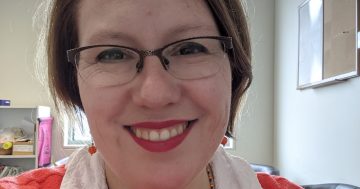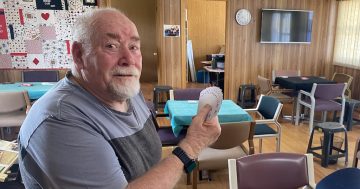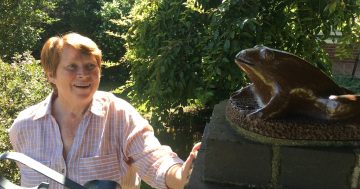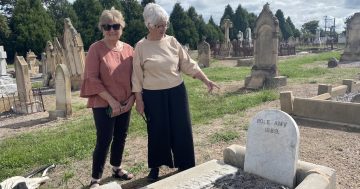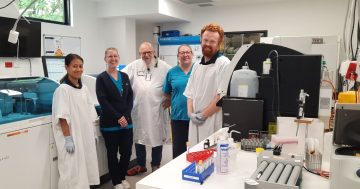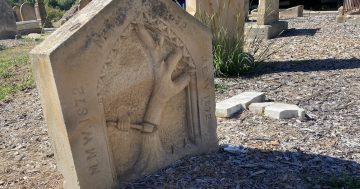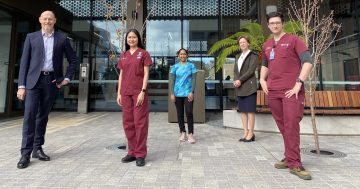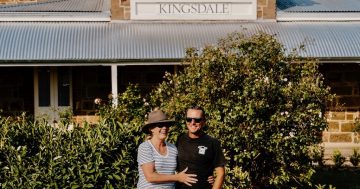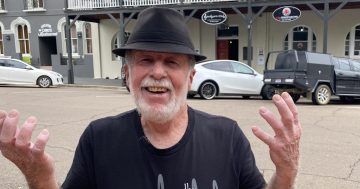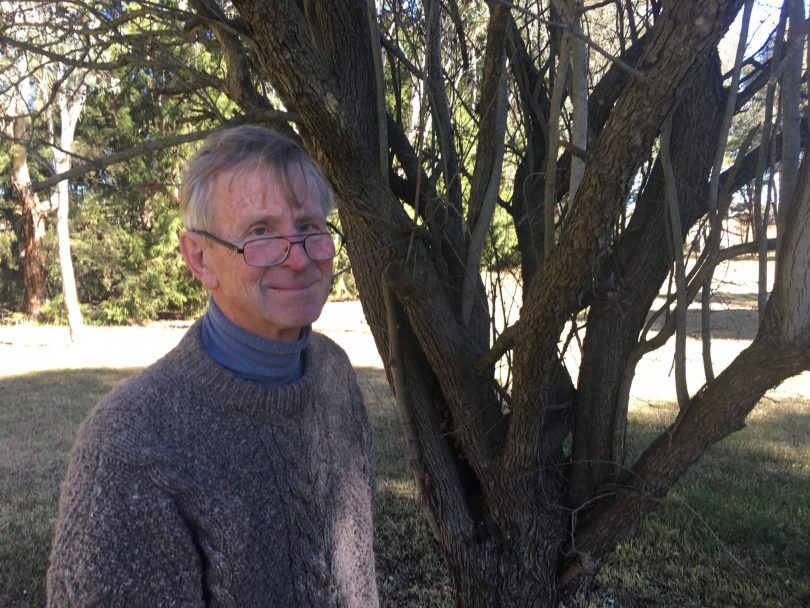
Dr John Docker in his garden. Photo: John Thistleton.
Dr John Docker will retire in February next year. Once involved in pathology and postmortems for the coroner, the Goulburn histopathologist has eased back to three days a week as a specialist at an anti-coagulant clinic monitoring people on warfarin for their hearts.
A lean, tall medico prone to self-deprecating smiles, Dr Docker belongs to a family highly regarded for their traditional values of health care. That came to the fore when a little old lady and a builder helped Dr Docker resist bureaucrats attempts to close down his pathology service. More on that later.
When he was young, broadening his training overseas, he left Barons Court Station, Hammersmith, each morning for a post-graduate medical school in London, three miles away.
“So I would walk there and back,” Dr Docker says. “I used to enjoy it, there are lots of sites around London anyway,’’ he says. This was back in the 1970s, and a few words from his squash partner, a senior medico, stayed with him too.
“He said you can drink if you want to, and it doesn’t matter if you drink a reasonable amount, as long as you run off the equivalent calorie value of that alcohol, you will probably be all right. That was something I kept in mind.”
The routine remains, and on most early mornings through the sun-lit fog in Goulburn, the 72-year-old strides resolutely off to work. Always keen for a game of tennis, he walks four kilometres to work and four kilometres home.
The first Docker to come out to Australia from England was a non-university qualified medico, and doctors have followed in the family ever since including general practitioner Ernie, the son of a doctor in Coonabarabran.
Ernie’s strong belief in medicine led his sons Noel and John and daughter Ruth, a nurse like her mother Annie, into the profession. From 1978 to 1990 Noel and John were practising in Goulburn at the same time as their father.
“We didn’t think of doing anything else, provided we could make it. I only just made it, but Noel was a fairly good student,” Dr Docker says.

Teenagers John, Noel and Ruth Docker. Photo supplied.
An obstetrician and gynaecologist, Noel’s giant hands would shake a new father’s hand in congratulations after delivering their baby. It is fair to say new mothers fell in love with the Big Man, as his family called him, who died in 2009 aged 67.
After six years at the University of Sydney John’s pre-registration year was spent at Newcastle Hospital. There he met a Newcastle nurse and physiotherapy student, Janet Tweedie. Now married to Janet, he says the first romantic move remains a topic of conjecture.
“One day when I was on call doing the covering, and she walked in to the desk as well and she chatted a little bit – that she doesn’t admit to – then we met up when I was doing an orthopaedic ward,’’ he says, another grin breaking out.
About this time a fellow student encouraged him to take one of two jobs as pathology registrars. At the time a postmortem was held for everyone who died in hospital.
“That’s why my friend was keen in getting me into that year, otherwise he would have had to do all the postmortems. I did have dreams in the early stages, a situation where the entry part of the morgue was packed with bodies, piled all up,’’ he says with a chuckle. “It never happened fortunately.’’
In London later for tuition he landed a job almost straight away doing out-of-hours testing on tissue samples. Returning to Goulburn he took over Dr Alan Hazelton’s private practice as well as postmortems for the coroner, and private pathology work for McKell Place doctors.
“Then we had the great punch up with the (NSW Health) administrators over the presence of pathology in Goulburn at all,” he said. “I would have been cast as the villain pretty much in terms of the administrators and was the one targeted. But it actually started with a little old lady, she was really quite advanced in her years, in her 80s and she had moved to Goulburn and needed to have her I and R (blood testing) done because she was on warfarin.
“She started it all getting signatures from people. She was down at the markets in Belmore Park and she started this petition, it grew from there. The other one who made a tremendous impact was (builder) Bill Cooper. He really did threaten them at times.”
A heart attack at age 49 and subsequent care at Goulburn Base Hospital turned Mr Cooper into a fearless champion of health practitioners, and a formidable fundraiser.
Yet contract renewals continued to trigger aggressive negotiations with Dr Docker. “They would make you re-apply every year and that got down to three months. This was really just niggling to try and drive you out,’’ Dr Docker said. But he stayed.
Histopathologists look through a microscope at diseased tissues, and their interpretations have a crucial bearing on treatment.
“There has alway been a possibility in the past that if you are looking at someones gastric cancer you won’t necessarily predict the behaviour of that by interpreting the microscopic appearance,” he says.
Despite the challenging nature of his work he reflects positively on progress made, perhaps in part because his exercise regime has been so consistent. Dr Docker says exercise has been known for a long time to control mental health problems and raise the feeling of well being. “For those sorts of reasons, you can’t pass it by,” he says.












